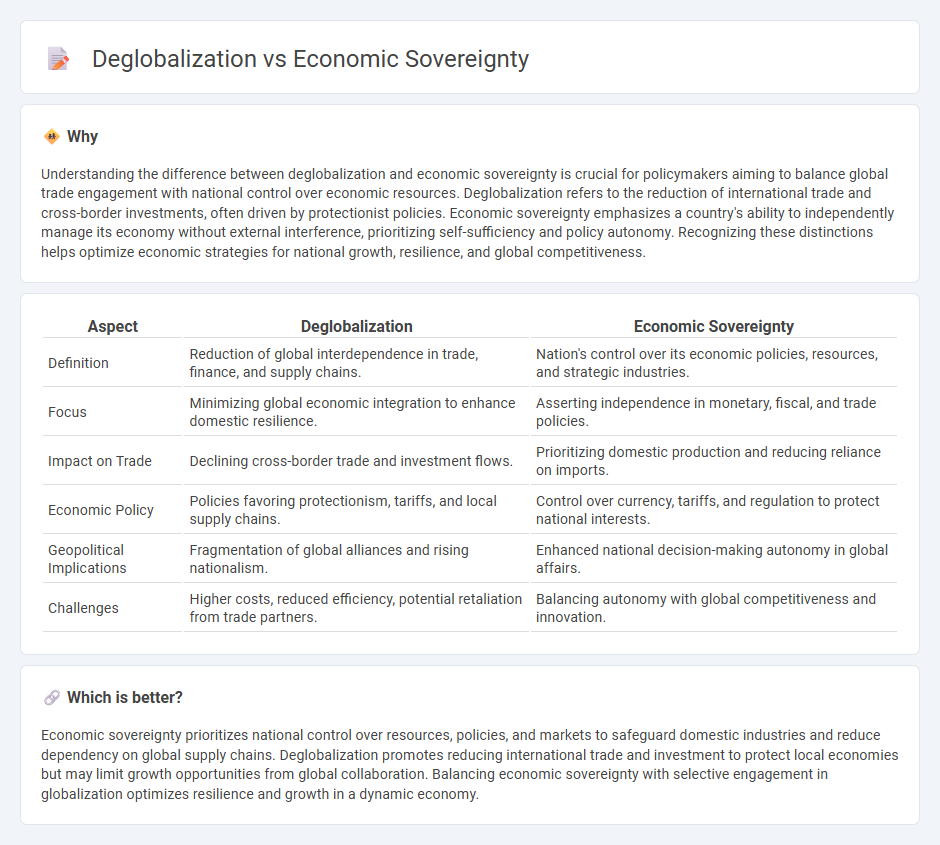
Deglobalization emphasizes reducing dependence on international trade to strengthen domestic industries and protect local jobs, while economic sovereignty focuses on a nation's ability to control its own economic policies and resources independently. Both concepts aim to enhance national resilience amid global economic uncertainties and geopolitical tensions. Explore the implications and strategies behind deglobalization and economic sovereignty to understand their impact on the future economy.
Why it is important
Understanding the difference between deglobalization and economic sovereignty is crucial for policymakers aiming to balance global trade engagement with national control over economic resources. Deglobalization refers to the reduction of international trade and cross-border investments, often driven by protectionist policies. Economic sovereignty emphasizes a country's ability to independently manage its economy without external interference, prioritizing self-sufficiency and policy autonomy. Recognizing these distinctions helps optimize economic strategies for national growth, resilience, and global competitiveness.
Comparison Table
| Aspect | Deglobalization | Economic Sovereignty |
|---|---|---|
| Definition | Reduction of global interdependence in trade, finance, and supply chains. | Nation's control over its economic policies, resources, and strategic industries. |
| Focus | Minimizing global economic integration to enhance domestic resilience. | Asserting independence in monetary, fiscal, and trade policies. |
| Impact on Trade | Declining cross-border trade and investment flows. | Prioritizing domestic production and reducing reliance on imports. |
| Economic Policy | Policies favoring protectionism, tariffs, and local supply chains. | Control over currency, tariffs, and regulation to protect national interests. |
| Geopolitical Implications | Fragmentation of global alliances and rising nationalism. | Enhanced national decision-making autonomy in global affairs. |
| Challenges | Higher costs, reduced efficiency, potential retaliation from trade partners. | Balancing autonomy with global competitiveness and innovation. |
Which is better?
Economic sovereignty prioritizes national control over resources, policies, and markets to safeguard domestic industries and reduce dependency on global supply chains. Deglobalization promotes reducing international trade and investment to protect local economies but may limit growth opportunities from global collaboration. Balancing economic sovereignty with selective engagement in globalization optimizes resilience and growth in a dynamic economy.
Connection
Deglobalization fosters economic sovereignty by encouraging nations to reduce dependence on global supply chains and emphasize domestic production capabilities. This shift enhances control over critical industries, strengthens local economies, and mitigates vulnerabilities from international market fluctuations. Countries prioritize self-reliance to secure economic stability, protect strategic resources, and influence trade policies aligned with national interests.
Key Terms
Trade barriers
Economic sovereignty emphasizes the ability of nations to control trade policies, often leading to the implementation of tariffs, quotas, and other trade barriers to protect domestic industries and maintain strategic autonomy. Deglobalization, characterized by reduced global interconnectedness, intensifies the use of trade barriers as countries prioritize self-sufficiency and reduce dependency on international supply chains. Explore the intricate relationship between economic sovereignty and deglobalization to understand their impact on global trade dynamics.
Nationalization
Economic sovereignty emphasizes a nation's control over its resources and industries, often through nationalization to protect strategic assets and reduce reliance on foreign entities. Deglobalization trends amplify this by encouraging countries to reclaim economic autonomy, limiting global interdependence and reshoring critical sectors. Discover how nationalization strategies reshape economic sovereignty in the context of deglobalization pressures.
Supply chain resilience
Economic sovereignty emphasizes a nation's control over critical industries and supply chains to reduce external dependencies, enhancing national security and economic stability. Deglobalization drives the restructuring of global supply networks to prioritize local and regional sources, aiming to minimize disruptions from geopolitical tensions and pandemics. Explore how these trends shape supply chain resilience and global economic strategies.
Source and External Links
Economic Sovereignty - Term - Economic sovereignty is a nation's ability to govern its own economic decisions and policies independently, including control over natural resources, fiscal discretion, monetary authority, trade policy, and regulatory power, without undue external influence.
Redefining Europe's economic sovereignty - Europe's economic sovereignty refers to the EU's capacity to determine and protect its economic destiny amid global geopolitical pressures, requiring coordinated policy in areas like investment screening, competition policy, and monetary autonomy to safeguard its strategic interests.
Economic Sovereignty: Develop more sovereign approaches - Economic sovereignty involves mastering key functions of a country's economy and ensuring strategic autonomy, especially highlighted by recent crises prompting efforts in industrial relocation, control of foreign investments, and enhanced public funding for critical sectors.
 dowidth.com
dowidth.com